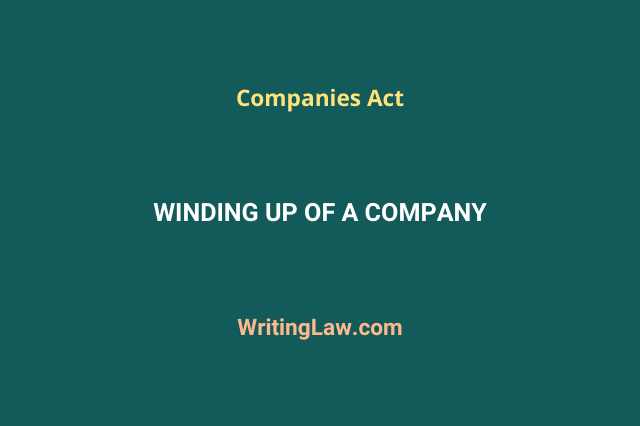
Winding up by the court is the second method of bringing the life of a company to an end. The first way is voluntary winding up, which has now been omitted.
Winding up is not the same as insolvency or bankruptcy of an individual, as a company cannot be made insolvent under the insolvency laws. The company is not dissolved immediately at the outset of winding up. It continues to do business as usual.
Further, the remedy of winding up is a remedy of last resort. It may not be permitted when an equally effective alternative remedy is available. Furthermore, as per section 270 of the Companies Act, 2013, the winding up of a company can take place either by the court or voluntarily (by members or creditors).
Here, in this article, you will read about the winding up of a company by the court.
Circumstances in Which a Company May Be Wound Up
The court may wind up a company. This is also known as compulsory winding up. The circumstances in which a company can be wound up are provided under section 271 of the Companies Act. They are:
1. Special Resolution
A company may be wound up by the court if it (the company) has decided to do so through a special resolution. On the other hand, the court is not obligated to order the winding up. The power is optional and may not be exercised if it is against either the public or the company’s interest.
2. Default in Holding the Statutory Meeting
A court may order a company to be wound up if it fails to submit the statutory report to the registrar or hold the statutory meeting. The power is optional. In addition, rather than ordering the company to wound up, the court may require the company to deliver the statutory report or hold the meeting correctly.
3. Failure to Commence or Suspension of Business
If a company does not start doing business within a year of its incorporation or stops doing business for a year, it may be ordered to be wound up. Again, this is a discretionary power that will only be exercised if there is a reasonable suspicion that no business will be undertaken.
4. Deduction in Membership
If the number of members is reduced in the company (below seven in a public company and below two in a private company), it may be ordered to wound up.
5. Incapacity to Pay Debts
In case a company is not able to pay its debts, it can be ordered to wind up. A company is considered to be unable to pay its debt in three instances:
(i) statutory notice
(ii) decreed debt
(iii) commercial insolvency
6. Just and Equitable
Whenever the court believes that it is just and equitable that the company be wound up, it may order for the same.
7. Act Against National Interest
Where a company commits any act which is against the security and integrity of the country, public policy, destroys foreign relations or is immoral, the tribunal (the court) can order for the winding up.
Who Can Apply for Winding Up of a Company by the Court
An application for the winding up of a company is made to the court via a petition. Moreover, it can be submitted by any one of the following according to section 272 of the Companies Act:
- By company
- By creditor (it includes secured creditor, debenture holder and a trustee for debenture holders)
- By any contributory or contributories (shareholders are known as contributories after the commencement of the winding-up)
- By contributories (also called contributors)
- By central government or any person on that behalf if a case falls under section 271(b) of the Companies Act, 2013.
Commencement of Winding Up of a Company
The winding up of a company begins from the time the petition is presented and not when the order is issued. If the company passes the resolution in case of voluntary winding up, in such cases winding up is considered to commence at the time of the passing of the resolution.
Further, if in case there is more than one petition, winding up is considered to have been commenced from the date of the earliest petition (first petition).
However, the process of winding up begins from the date of the order.
Consequences of Winding Up Order
The order of winding up has several outcomes.
1. A winding up order is deemed to be a notice of discharge to the employers and officers of the company, except when the business of the company is continued.
2. When the winding up order is issued, the official liquidator becomes the company’s liquidator by virtue of his position.
3. After the order, no legal action or litigation against the company can be brought against it without the court’s permission and is subject to the terms imposed by the court. If the suit is pending at the time of the order, it may only be continued with the court’s permission.
Read Next:
1. 13 Characteristics of a Company
2. Types and Classification of Company Under Companies Act, 2013
3. What Is Registration of Charge Under Company Law
- Understanding the Legislative Branch of the Indian Government - 6th May 2024
- Appointment, Oath, and Removal of Constitutional Posts in India - 28th April 2024
- Powers of Income Tax Authorities in India - 26th April 2024







